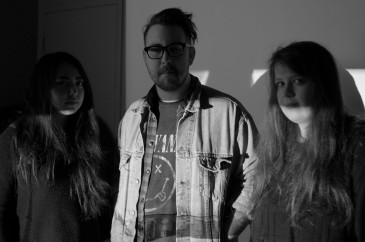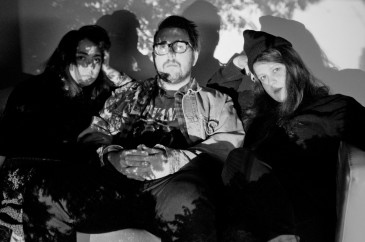
The only genre tag on Watermelon’s Bandcamp page is pop. Not low-fi, or dream pop, or surf pop, although those descriptions would fit just as well. This trio defines itself with one simple three-letter word. It’s an umbrella term that shelters a wide range of musical qualities. Under this arch of clever and crass tunes, Watermelon brings intelligence to musical accessibility. Their seemingly effortless sound reminds listeners that the magic of good pop can be at the same time simple, and filled with substance.
I sit in Milano Coffee on West 8th with Akanee Yamaki (drummer) and Thom Lougheed (guitar/vocals) of Watermelon. The café’s wide glass windows present John Rogers Park as the autumn backdrop to our conversation. With the sun colouring a formerly dreary afternoon, conditions are ideal to discuss pop music’s warm charm with two experts on the subject.
Yamaki, Lougheed, and bassist Sophie Sweetland (absent at the interview) have earned Watermelon a pat-on-the-back reputation for performing exceptionally enjoyable tunes over the past three years. Corresponding with their self-imposed pop identity and cheerful green and pink title, Watermelon has a summery appeal, which is also overwhelmingly visual. In fact, most of Watermelon’s ocular tunes follow a formula that uses foggy vocals, almost thick enough to see. Amidst the words, Yamaki’s drum beat flips like a picture book, while guitar notes sketch riffs in animated sequence. Referencing one the band’s most celebrated songs, “How I Came,” I ask Lougheed of the pop paradox: is it difficult to write something simple?
His immediate answer is yes. His more gradual explanation is that, “A lot of well constructed pop music is not as simple as you think.” Yamaki adds. “Making something good that’s simple is hard, because there’s not really much there to cover up what’s bad about it.” For Watermelon, the lesson is to avoid over analyzing songs while writing them. Lougheed gives an example of his own song writing process.
“Sometimes I’ll try to break a song down to just four cords in a pleasing order.” Although once and a while, four cords can seem excessive. “How I Came” achieves perfection with just two. An ode to the Spunky Onions song “How I Lost My Virginity,” this minimalist tune is an example of just how alluring the uncomplicated can sound.
Of course Watermelon has catalogued many other tunes since forming in 2009. As a live band, they are prolific in the city, although there is little recorded evidence to back this up. Yamaki confesses, “We haven’t been on tour, we have one split, we don’t even have a proper EP. It would be really nice to get something out there.” No longer limiting themselves to wishful thinking, Watermelon is now in the process of ticking off those shortcomings. After a brief hiatus, their goal now is to finish recording their first full length album. Working with a friend at Nimbus, the album is partially complete, though frozen until their schedules align. Once things get rolling, Watermelon will also release a cassette with Green Burrito. “We’re just regrouping at the moment,” Yamaki says.
In this case, regrouping will not mean reassembling Watermelon exactly as it was. Recent jam sessions with Bobby Siadat (drummer in Weed) have taken on more serious connotations. As it stands, Yamaki and Lougheed anticipate Siadat’s inclusion as Watermelon’s fourth member, and second guitarist. Although pleased with the current instrument arrangement, Lougheed is open to change. “When you have more people it’s a lot harder to be organized, but it also kind of frees you up musically.” Yamaki agrees, “It’s also nice to have more people to bounce ideas off of. We’re all really good friends and we spend a lot of time together, so it’s good to have somebody else who’s outside of that.”

Placing such value on objectivity makes sense when you realize how close Watermelon has become over the years. All three members grew up in White Rock and have been close friends since high school graduation. When asked about their most memorable experiences with the band, there’s a long pause. “We all hang out a lot of the time, so things are casual” Yamaki reasons. Lougheed laughs “if we had toured more we might have road stories.” Almost a road story, Yamaki eventually recalls a set they played at Sled Island this summer. “A girl came up to us and was like ‘it’s so great that you have girls in your band! I didn’t know that you were allowed to be in a band if you were a girl!’” Lougheed comments, “I was pretty taken aback by that.”
We all laugh about Watermelon’s feminist crusade in Alberta. Hopefully when the album is released, they’ll send a few copies to Calgary.
Check out Watermelon’s summery sounds and free downloads at watermelon.bandcamp.com

